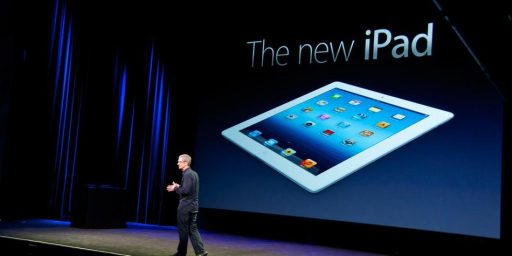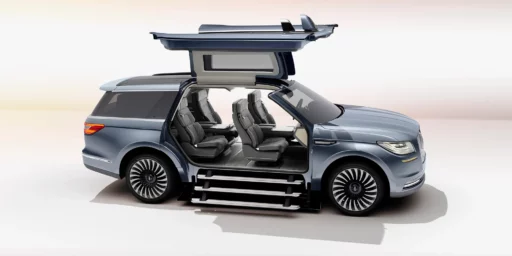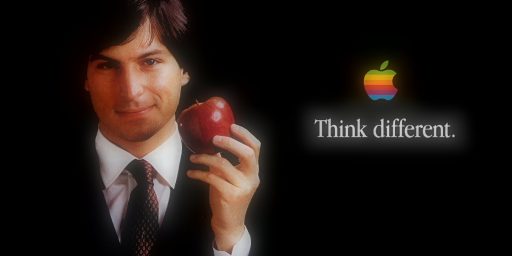Steve Jobs: Post-PC Era Coming
Apple’s Steve Jobs says the personal computer is soon to be a relic of a bygone age:
RANCHO PALOS VERDES, Calif.–At the D8 conference here, Steve Jobs didn’t whip out the newest iPhone or tell us which category will be next to get an “i” before it, but his words offered a glimpse of where the iconic CEO thinks the industry is headed.
Speaking for an hour and a half at the D: All Things Digital confab, Jobs said the day is coming when only one out of every few people will need a traditional computer.
“When we were an agrarian nation, all cars were trucks because that’s what you needed on the farms.” Cars became more popular as cities rose, and things like power steering and automatic transmission became popular.
“PCs are going to be like trucks,” Jobs said. “They are still going to be around.” However, he said, only “one out of x people will need them.”
Jobs said advances in chips and software will allow tablet devices like the iPad to do tasks that today are really only suited for a traditional computer, things like video editing and graphic arts work.
The move, Jobs said, will make many PC veterans uneasy, “because the PC has taken us a long ways.”
“We like to talk about the post-PC era, but when it really starts to happen, it’s uncomfortable,” he said.
Jobs noted that people still laugh at him when he talks about the iPad as magical, and he tried to put that feeling into more concrete terms. “You have a much more direct and intimate relationship with the Internet and media and apps and your content,” Jobs said. “It’s like some intermediate thing has been removed and stripped away. Like that Claritin commercial where they strip away the film–it’s like that.”
While I’m still a PC guy and likely to be for some time, this strikes me as right. Really, while I do word processing and whatnot, even on my multiple PCs, I’m mostly working on the cloud. The only reason I use a desktop is because I prefer a big keyboard and large, dual monitors, not because I really need a lot of capability that an iPad type device couldn’t provide.
What drew me to to write about this piece, though, is Jobs’ strange assertion about the history of the automobile. The first cars were glorified carriages, replacing the horse and buggy for a wealthy elite. Not only were they unsuited for driving on the unimproved roads of a farm, they didn’t have the horsepower to carry a load. Trucks came along well down the line and never held a larger market share than cars.
UPDATE: Kevin Drum had the same thought re: the trucks analogy and several helpful commenters suggest that Jobs was referring to the Ford Model T, the first mass market car, rather than the earlier vehicles available only to the elite. This thesis is interesting and plausible except for the minor objection that the Model T was in no ways a truck, nor ever intended as a farm vehicle.
via KurzweilAI







Is Mr. Jobs confusing personal computers and Personal Computers? An iPad is a personal computer.
If he’s predicting the end of Wintel dominance in personal computing, he may be right but that’s something that Apple has been saying for a couple of decades now.
Jobs is conflating a few things on the computer side as well. There is a longstanding body of work on “ubiquitous computing,” which is all about devices being small, cheap, and everywhere.
On the other hand:
There he is just saying that chip advances will make the iPad into a serious computer. So it’s smaller and lighter but … the real contrast to ubiquitous computing is how many you have around the house. If you have extra iPads just laying on the coffee table, or in your dentist’s waiting room, that’s game changer. If on the other hand the ratio of iPads to “owners” are still 1:1, then you’ve only changed the shape of (one of) your computer(s).
BTW, I think an iPad would rock as a tourist computer. Street maps. Walking tours. Was the snake that just bit me poisonous? In that role it is just another iteration on “portable computer,” but kind of a rockin’ one.
Mr. Jobs has a certain perspective on the world, but he is almost always oblivious to what drives a large portion of electronics: porn and games. The latter is particularly important because new gadgets like iPhones and iPads don’t have a proper interface for the most popular types of games, like first person shooters and racing games. Jobs made zero effort to support games on the Mac which held them back greatly in marketability, and his company is doing just a tad more now. And they are actively fighting the porn side (which of course can be seen as some combination of bad business and good ethics).
Not to mention, people want large screens for the foreseeable future, whether for entertainment (watching TV over the Internet) or business presentations or whatever. And you can’t conveniently lug around a large screen, at least until some sort of ultrathin foldable type becomes affordable.
In other words, things like the iPad certainly have their place, but as a total replacement, they currently fall well short of his goals.
Jobs is more right than wrong here. Games are now mostly done on X-Box and its ilk. Large screens, the mouse and large key pads can be plugged into smaller, portable machines when needed but then be left behind when away from the office. Not everything will be on an iPad but most will be on less than a bulky home PC. And I think your are correct john personna, the ratio will remain very close to 1:1 while phones continue to evolve.
john personna,
I think you are very correct re: ipad as a vacation device. As soon as the ipad was revealed, I thought “You know, with wikipedia and various travel websites, the ipad is essentially the hitchhiker’s guide to the universe.”
Heh. I didn’t consciously think of the HHG, but it sure shaped my early views of technology. Maybe we should hack “DON’T PANIC” into the start page of an Android pad 😉
I don’t imagine this is even very controversial anymore… laptops have been outselling desktops for years now, right? Tablets are the next logical step.
Desktops pretty much are only the first choice of people who are mainly concerned over the price/performance ratio… which is already a distinct minority.
I have trouble imagining workplaces changing wholesale away from sitting at desks however… though I could see people plugging their tablet into a couple of monitors and a mouse and keyboard for a days work… that doesn’t strike me as terribly revolutionary.
Reviewing the Ubiquitous page, I see this:
So, maybe the decision to say iPad, rather than iTablet or iSlate has something to do with that.
Console lovers have been predicting the end of PC games for 15 years and counting now. But they’re still going solid because PCs are still best suited for certain types of games. That’s *slowly* changing, as plug-in keyboards and wheels and Internet access become more widespread. But there’s another factor as well – Microsoft, Sony, Nintendo, and now Apple have final say over whether a product comes out on their proprietary machines. That’s not true for the PC, which gives developers freedom and saves them money.
Anyway, these types of claims that such-and-such will soon be obsolete are almost always premature. Although admittedly, Jobs doesn’t actually give a timeframe, at least not in the blurb above. So yeah, he’ll be *somewhat* right, *someday*.
First: Never bet on Jobs being wrong. It was just a few months ago we were hearing that the iPad might be a disappointment because it couldn’t handle Flash. Well, Jobs stabbed Flash in the neck and left it bleeding, while selling 2 million iPads in 2 months.
Second: The young will define the market and they are less and less tethered to a machine in situ. They are impatient for devices that are almost (or even actually) a part of themselves. The lines between human and computer are blurring. Already most people have stopped memorizing phone numbers having outsourced that memory function to their phones. And Google isn’t an externality anymore to many kids, it’s fully integrated into their lives and thought processes.
Third: Screen size is relative to distance from the observer. An iPad twelve inches away is as big as a widescreen eight feet away. And I suspect three kids with three iPads at a Starbucks or in their bedroom, is a more plausible picture of the future than three kids tethered to the TV in the living room.
Fourth: I don’t think Jobs objects to porn in principle, I think he’s avoiding clashes with paranoid parents. Jobs wants iPads in the hands of every kid in the world and taking a visible stand against porn in apps (while doing nothing to block Safari from going to porn sites) helps him. I would note that Safari has long had an ability to open windows that leave no trace in history. What do you suppose that’s about?
Jobs has a “nothing succeeds like success” thing going for him right now. Mark Weiser may have figured out the “pad” placement 20-30 years ago (he’s been dead 10 years), but now it’s “Never bet on Jobs being wrong.”
The way of the world.
BTW, I do recognize that Jobs can make something happen where other readers of Weiser may not … just because he has a loyal customer base who will trust his decisions about products sight unseen. That’s what I mean by his “nothing succeeds like success” advantage.
(It will be interesting how much openness Jobs will yield in his rumored AppleTV iteration. The old one was a little closed for a general audience, but now he faces boxee boxes and rokus etc.)
I think Jobs succeeds because he understood earlier than most of the Geekocracy that geeks were not the market. What he got was that computers and MP3 players and phones were consumer goods. The geek elite liked their wires and their function keys and their endless updates and upgrades and patches and secret languages. The rest of us wanted our computers to be like our cars: intuitive, reliable, safe and cool. We just wanted to turn the key and go.
He did that. The Microsofts and Dells and Gateways did not. And as an aside he became the single most powerful person in media with iTunes, Pixar, the iPad, and the Apple bookstore.
The only reason I use a desktop is because I prefer a big keyboard and large, dual monitors, not because I really need a lot of capability that an iPad type device couldn’t provide.
JAmes I’d like to point out you listed a capability right there that the Ipad does not provide.
@Mr. Prosser : You are very incorrect sir in your statement that gaming is mostly only on consoles. The PC gaming market is still a huge market and will not disappear for a number of reasons (cheaper better performance etcetc). I personally am one of many people that do not own a 360 (+50% failure rate) or a p3 (too pricey and fewer games) but I’m still a gamer. I do almost all my gaming exclusively on my computer due to superior hardware and overall capabilities (the good “console” games generally end up on the PC platform anyway). Without major changes the Ipad probably wouldn’t even be a threat to the DS in gaming..
@J.W.Hammer : Yeah you would then be using your Ipad as a glorified desktop which is what a lot of laptop users I know do with their laptops. Desktop sales is NOT a distinct minority of the computer market. Laptops are outselling desktops though (a trend starting back around 2003) but not by anything resembling what you’re trying to claim.
@Franklin : Oh man I remember how the desktop PC has been DOOOMED!! since like litterly the NES days…
@Michael Reynolds : If you think apple PCs are “safe” then you’re delusional. My home built (it’s easy BTW) XP machine has crashed a handful of times in 5 years while never losing data and never having an infection of any kind. I just push the button it starts up and I go.
I’m with Franklin. I can see PCs disappearing if it gets to the point where the Game Machines have more or less merged with PCs in terms of functions and internet access, but not until then. I’m sure an iPad works great for the average person in terms of function, but it isn’t even close to what the latest computer games often require to run.*
*Personal confession: I bought a new PC a month ago, as new a model as I could get (I’m too lazy to build a computer, even thought that would probably be cheaper and better). I won’t lie – a major factor in my decision to do that, as opposed to buying a replacement laptop, was because I’m planning on playing Starcraft 2 quite a bit when it comes out.
Apple just has a flavor of geek, lined up around the block at every introduction. Normal people don’t do that.
BTW, you could also read about the Xerox Altos, and SJ’s visit to PARC. Your easy to use computers were born there. Apple was invited to come and borrow.
I became a Mac developer in 1984 because Apple did glom onto those ideas earlier than other mass-marketeers. At the same time I’m aware of what they borrowed from a wider comp-sci constellation.
(I’m not a Mac developer in 2010, because while I appreciate Job’s sense of the aesthetic, I don’t support his, or anyone else’s, closed little worlds. I’m platform agnostic, something Apple is loathe to accept even now.)
@matt:
Indeed; that was my point. I don’t see tablets making a big impact in the work place, except maybe for people who are on their feet a lot (like say MDs).
Yes… and I suspect that is mainly because most workplaces are desktop focused… they’re cheaper and you don’t have to worry about anyone losing
theiryour computer at a bar or wherever. For personal use however, I suspect the vast majority people are buying laptops… the price/performance trade off isn’t important to people who don’t shop at Newegg (a distinct minority).So, to sum up, I think tablets are probably going to ultimately be the primary computing device of most people… but that’s mainly because they have the potential to be like a much more fun and portable than a laptop, while still performing as well as they need.
In the workplace however, they largely seem irrelevant.
Killer platform for youtube instruction, how to fix your sink or how to cook dinner.
(the ebooks will suffer because while the iPad can give you a book, they can’t give you a video)
You’re dead wrong about personal use. The sales of desktop computer components are very strong and I guarantee you it’s not a corporate environment that is purchasing all of those parts either (they tend to lease pre-built and don’t buy high end components for repairs). Generally around here those that have a laptop already have a desktop of generally greater capability. Once laptops can match the price performance of a desktop (lol @ the 300 dollar laptops breaking down at a ridiculous rate) there will always be a large market for desktops. Once that price performance advantage fades and the cheap laptops become reliable then the desktop market will be whittled down to the minority as you claim..